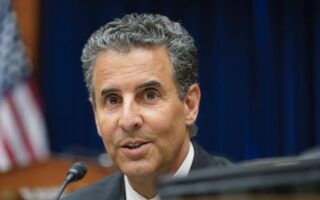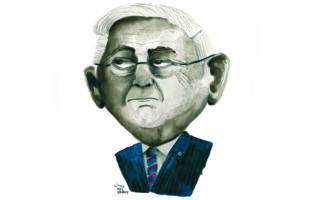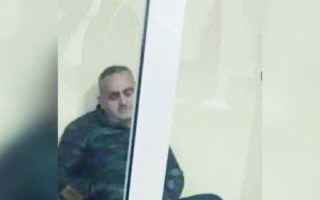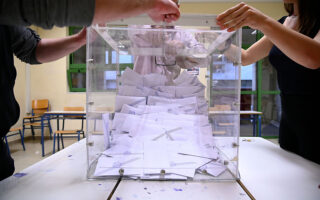Controversy erupts over Archbishop Elpidophoros
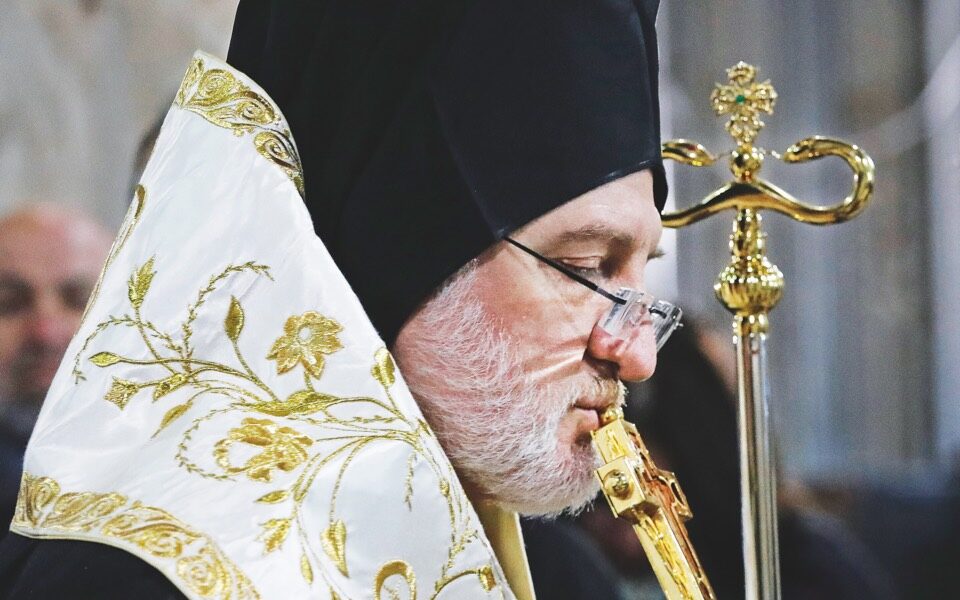
Efforts are under way to address mounting tension in the Greek Orthodox Archdiocese of America, centered on Archbishop Elpidophros, though some circles speak of imminent developments in the coming days. In Athens, in the Ecumenical Patriarchate in Istanbul and in the United States, discussions and behind-the-scenes initiatives have been frenetic over the past fortnight, though it will ultimately come down to Ecumenical Patriarch Bartholomew, who is keeping his cards close to his chest and has not even spoken to his close associates of what he plans to do.
The indisputable facts are the following: Greece’s deputy minister for foreign affairs, Alexandra Papadopoulou, traveled to Istanbul on Saturday, November 11, and stayed until the following Monday afternoon. She was officially received by the patriarch on Monday morning for a visit that lasted an hour and a quarter, and was followed by a luncheon. This included more people and stretched on for nearly three hours, a detail that has been construed as a serious indication of the climate in the one-on-one talks that preceded lunch being far from good.
According to other sources, the three-day visit comprised a broader agenda of diplomatic contacts with high-ranking Patriarchate priests and officials.
The object of all these meetings was, as diplomatic sources have confirmed, “to convey the [Greek] government’s concern over developments on the other side of the Atlantic, over the way the Archdiocese of America is being run.”
More specifically, the sources add, “reference was made to problems with the cohesion of the flock, the restriction of educational activities and the archdiocese’s financial affairs, while it appears that all of these issues have raised questions as to the motives dictating Archbishop of America Elpidophoros’ decisions for the archdiocese.”
One diplomatic source with knowledge of the events that have transpired underlines that while the government may have no decision-making power on such matters, “it does have the right to express concern.” It is a significant clarification, because the matter belongs entirely in the jurisdiction of the Ecumenical Patriarchate, which cannot appear to be influenced by external factors. The patriarch was reportedly extremely vexed to see the content of his meeting with Papadopoulou leaked to the press the very next day, while even more reports appeared two days later, after the Synod of the Ecumenical Patriarchate was convened for a briefing by Bartholomew on Papadopoulou’s visit.
The ecumenical patriarch conveyed his intense displeasure and concern, speaking even of “fake news” with regard to some of the details mentioned in certain reports, and questioned the motivations behind the leak, according to reliable sources, which added that the provenance of the leak is being investigated. Indeed, there is also concern about the leak at the diplomatic level because the last thing Athens wanted was to appear as though it were seeking to influence the Patriarchate’s decisions, particularly with regard to what this could mean in terms of reactions from the Turkish side.
The grievances
But what of the grievances being expressed with regard to Archbishop Elpidophoros? It appears that there have been multiple complaints and protests over the way that he has been handling the archdiocese’s affairs. More specifically, these concern apparent tension with a large number of metropolitan bishops that is making cooperation dysfunctional, efforts on the archbishop’s part to radically change the way the archdiocese operates and suggestions that he is seeking ways of endowing himself with more powers.
Other sources speak of his inability to adapt to the ways of the Archdiocese of America, which are completely different to the Ecumenical Patriarchate, arguing that this is the root cause of the constant tension with the bishops and other members of the clergy.
On the other hand, associates of Elpidophoros say that he is coming under fire because he wants to introduce changes that will improve the way the archdiocese operates. These changes are affecting parties who are seeing powers and financial rewards they never should have enjoyed in the first place being restricted, and who have banded together against the archbishop.
Ecumenical Patriarch Bartholomew has not shared his views on the essential aspects of the controversy, not even with his closest associates. He had traveled to Italy last Tuesday for a prior engagement, so any developments concerning the matter at hand are expected to take place this week.
An individual close to the patriarch’s inner circle, however, says that there have been no signs suggesting that the Patriarchate may be displeased with the archbishop of America, as opposed to past instances where the Patriarchate had to weigh in on matters concerning hierarchs under its jurisdiction and where it expressed its perturbation openly. According to the same individual, the problem appears to stem from the “exaggerated sensitivities” of certain people when it comes to the archbishop.
Divided diaspora
The situation with the Archdiocese of America is extremely unpleasant and very thorny, and it has caused a rift in the Greek-American community, a part of which has openly sided with Elpidophoros and supports his choices, while hailing the work he has done so far.
The president of the American Hellenic Educational Progressive Association (AHEPA), Savas Tsivicos, actually sent a letter to Ecumenical Patriarch Bartholomew, in which he dismissed the accusations against Elpidophoros as baseless, ascribing them to personal and possibly financial motives. He also pointed out certain important achievements made by Elpidophoros since taking over at the helm of the Archdiocese of America in 2019, such as completing the project of the Saint Nicholas Greek Orthodox Church and National Shrine at the World Trade Center and reviving the institution of Greek-Orthodox communities, among others. Tsivicos went on to request a meeting with the patriarch in mid-January to discuss the matter in greater detail.
In the rival camp, which is also quite significant in number, critics of the archbishop accuse him of pursuing a “divide and conquer” policy and of carrying out his duty in an unconventional way that causes problems for the archdiocese’s hierarchs and prevents them from doing their job. They also argue that his approach to the archdiocese’s affairs is eroding the Greek Orthodox Church’s influence and prestige, with many critics pointing in particular to the Elpidophoros’ presence at the inauguration of the Turkish House in New York in September 2021, an event that was also attended by the head of the Turkish-occupied north of Cyprus, Ersin Tatar.
Each side insists on its own truth, though the ecumenical patriarch is the one who has the final say. In the meantime, it is an issue that needs to be handled tactfully, since much is at stake, as the controversy is not purely of an ecclesiastical nature but has the ability to affect, among others, aspects of foreign policy and the Hellenic presence in other parts of the world.
As far as the matter of the Greek government’s concerns and how they were conveyed to the Ecumenical Patriarchate, people close to Elpidophoros speak of over-reactions, while referring to the meetings the archbishop of America had with the Greek prime minister in July in Athens and in September in New York. Deputy Minister Papadopoulou’s intervention, of course, points to concern at the highest level of government, with well-informed sources noting, in reference to the two meetings, “that relations with the Archdiocese of America are not black or white.”
